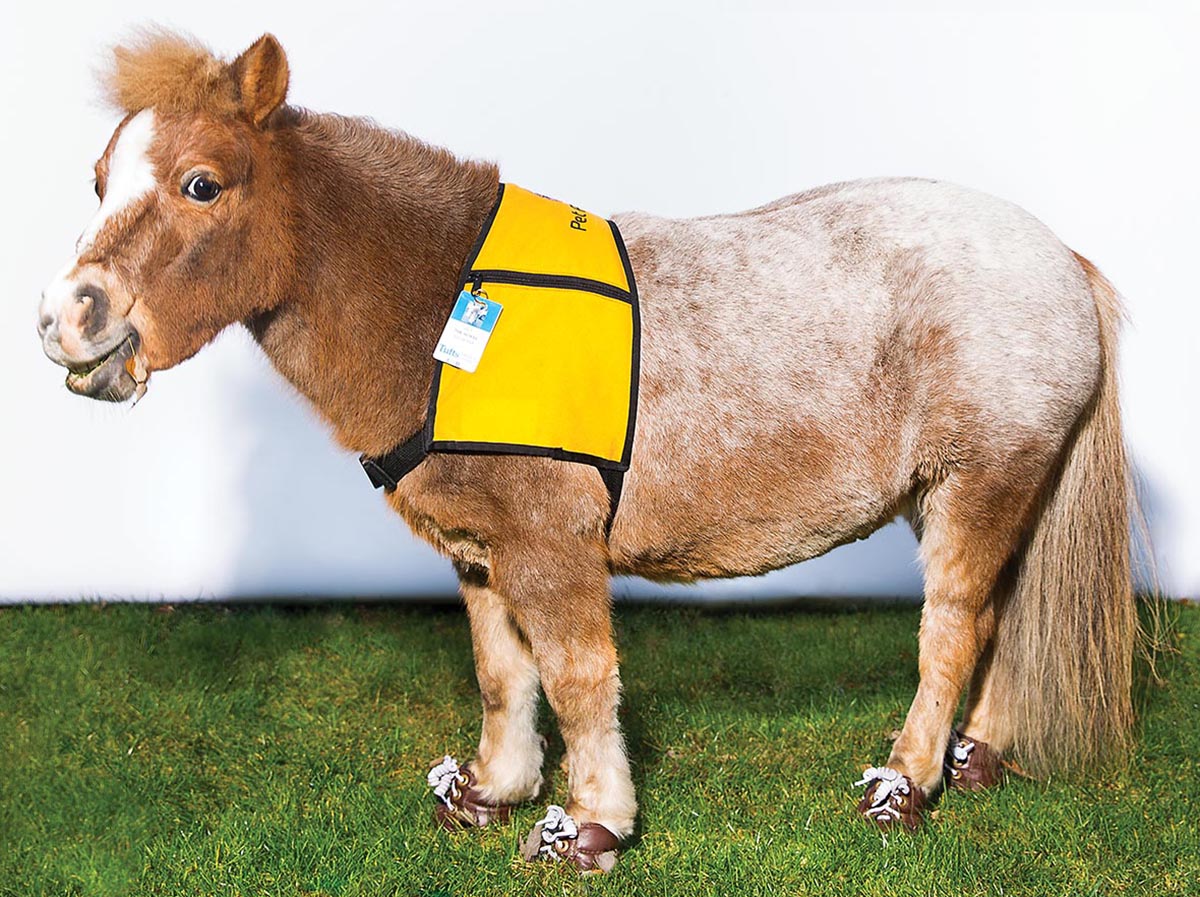Boston Hospitals with Therapy Animals, Yoga, and More
Healing isn’t just a physical act—increasingly, researchers have found that a patient’s mental health plays a major role in recovery. Enter therapy animals, yoga, and professionals dedicated to the art of listening.

Lily the therapy mini appaloosa dons a yellow vest and custom leather shoes in preparation for snuggling with patients. / Photograph by Trevor Reid
Kisses from a Mini Horse
Tufts Medical Center
In Pediatrics Room 734, Tage Jewell sits shirtless in bed. The high school freshman is being evaluated after passing out on the sideline of his JV football game. He’s used to the family dog sleeping next to him back home. At Tufts, Lily the volunteer therapeutic mini appaloosa fills the void. She’s part of Tufts’ Paws for People animal-therapy program—and she’s a mini celebrity. A camera-clutching crowd forms when she exits her minivan at the hospital’s entrance. She’s chill, though, having been meticulously groomed in her owners’ Raynham kitchen using an Anivac pressurized vacuum (no suds, no mess). Now, she lifts up her hooves as her owners slip on pink-laced, custom-made, $300 leather shoes so she doesn’t fall. She dons a yellow volunteer vest, and then she’s off to give patients her trademark snuffle kisses.
When she’s not nosing for treats, Lily seems to sense which patients will welcome her cuddles. (Staff in each hospital unit decide in advance which rooms she’ll visit.) “It definitely makes you feel better,” Jewell says after Lily snuggles up. “It makes you smile.” —By Michael Morton
Downward Dog for Kids
MassGeneral Hospital for Children
Most kids hate tests, and the cancer patients at MassGeneral Hospital for Children have to endure them all the time. They’re scary, they’re stressful, and for some kids, all the iPads and cartoons and toys in the world can’t distract them. Heather Peach and Caroline Armington’s yoga classes reduce stress and offer coping strategies that patients and families can use at the hospital and at home—like for the eight-year-old girl about to go through a port-accessing procedure. Yoga breathing techniques kept her calm.
Every Monday, Peach and Armington clear a space in MassGeneral’s hematology and oncology waiting room, then turn on some relaxing music and unfurl the yoga mats. Working around wheelchairs and IV lines, they lead up to six children at a time through breathing exercises and kid-friendly poses like boat, tree, and mountain. Sometimes, children even roll dice to choose the next move. —By Michael Morton
Listening Is the Best Medicine
Brigham and Women’s hospital
As associate director of Brigham and Women’s hospitalist service, Rob Boxer heals but also soothes. He’ll meet with families bedside (rather than behind closed doors, as doctors did in the past) to carefully weigh a patient’s wishes, prognosis, and treatment options. Boxer can spend up to 30 minutes with a family, and even facilitate hospice care. Dedicated to communication and seamless transitions, hospitalists now make up the fastest-growing subspecialty in the U.S. “You might lose out on longitudinal care,” Boxer says, “but you’re taking care of a family at a stressful, scary period.” —By Kara Baskin
Medicine Goes Ultra Pet-Friendly
Tufts Medical Center
Equine visits are just the beginning. Tufts also employs a guinea pig named Ralphie, among other animals, who first must appear on the Pet Partners’ approved species list before they’re okayed locally by Paws for People. And they need to like being clean: Within 24 hours of a hospital visit, pets are bathed and groomed. —By Michael Morton and Kara Baskin
Related:
Therapy Animals | Apps & Companions | Food & Art | Longwood Visitor Hacks | Super-Luxe Amenities | Real-Life Accommodations | The Ultimate Physical | Niche Specialties
Plus, more from our 2015 Top Docs package, including a database of the best doctors in Boston.


